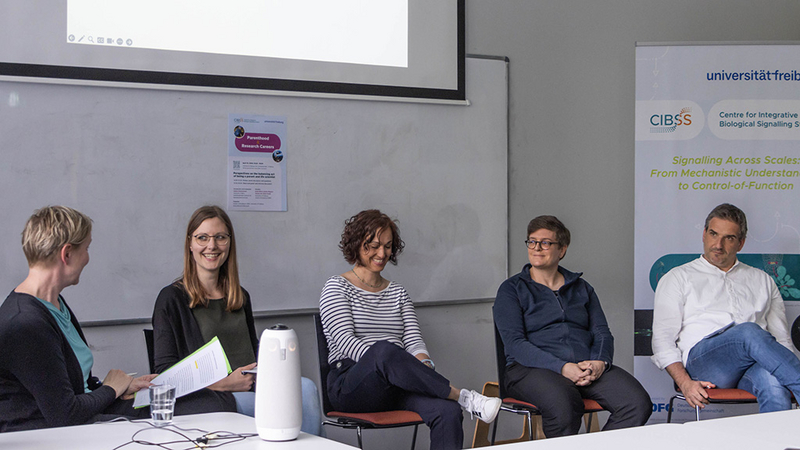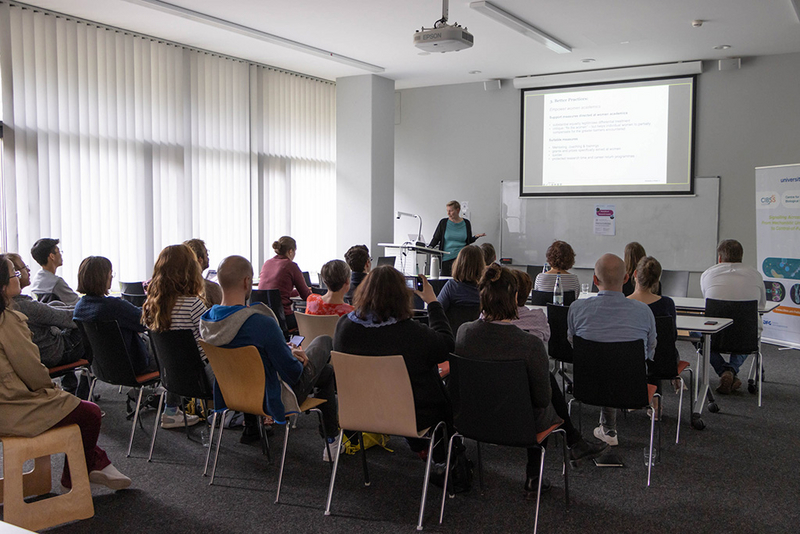The discourse on the double burden of being a scientist and a parent is often seen as part of the discourse on gender inequality in academia. In her introductory talk, Zimmermann questioned this view: “The narrative is still that women need to figure out how to combine parenthood and career, but we need to stop focusing on women and instead fundamentally re-think existing structures and stereotypes,” she said. By referring to data from the Swiss research project “Gender & Science”, which she has conducted with her team 2018-2023, Zimmermann argued that traditionally male stereotypes are a fundamental problem in academia. She highlighted that in a success-driven and competitive environment, in which self-conceptions such as “my job is my life” are common, those with caregiving responsibilities are disproportionately affected, leading many talented young scientists, especially women, to leave academia. “Many leave academia not because they aren’t capable, but because they actively decide against the prevailing work environment,” Zimmermann said.
The discussion panel featured four CIBSS researchers who are also parents. They openly shared their experiences, emphasizing the importance of support from both their personal and professional environments.
Dr. Katrin Schüle, a postdoctoral researcher and mother of a two-year-old daughter, credited her husband and family for enabling her to work full-time. She also mentioned the crucial support of her research group leader, Prof. Dr. Sebastian Arnold, who ensured that her contract was extended during her parental leave, as well as support from the CIBSS mentoring program. Still, she feels she missed out on opportunities abroad when she decided to move back to Freiburg to be close to her family.
Prof. Dr. Susana Minguet, a mother of three and research group leader at CIBSS, described being a parent and a scientist as a constant balancing act. She sees a lack of support for working mothers in Germany and recalls how she had to learn to cope with being criticised for not staying at home with her children.
Prof. Dr. Thomas Ott, father of two who shares caregiving responsibilities equally with his partner, shared the experience of constantly almost-failing either work or family obligations. However, he noted that, unlike his female colleagues, he was never criticised, but rather encountered a mixture of admiration and skepticism.
Prof. Dr. Sonja Albers told of her experience in the Netherlands where it is common for children to attend kindergarten from a very young age, which made it much easier for her and her husband to both pursue successful careers. She sees easier access to early childcare options as one important lever to make it easier to combine family and career.
The panelists agreed that while systemic changes are necessary, every research group leader can offer substantial support to group members who care for children. They suggested practical measures such as not scheduling meetings after 3 pm, offering flexible work hours, providing long-term contracts, and encouraging fathers to take on caregiving roles. However, while this does help on an individual level, they emphasized that this does not address broader systemic issues like the intense competition for positions and funding in academia. Nevertheless, the mentioned measures are already part of a fundamental change of academic working culture that needs to take place if academia is to become a more inclusive place for people with different ways of living and needs.
In response to the question, "What is the best time to become parents if both partners are in academia?" the panelists concluded that there is no perfect moment, only less challenging ones, and encouraged attendants to just take the leap.







